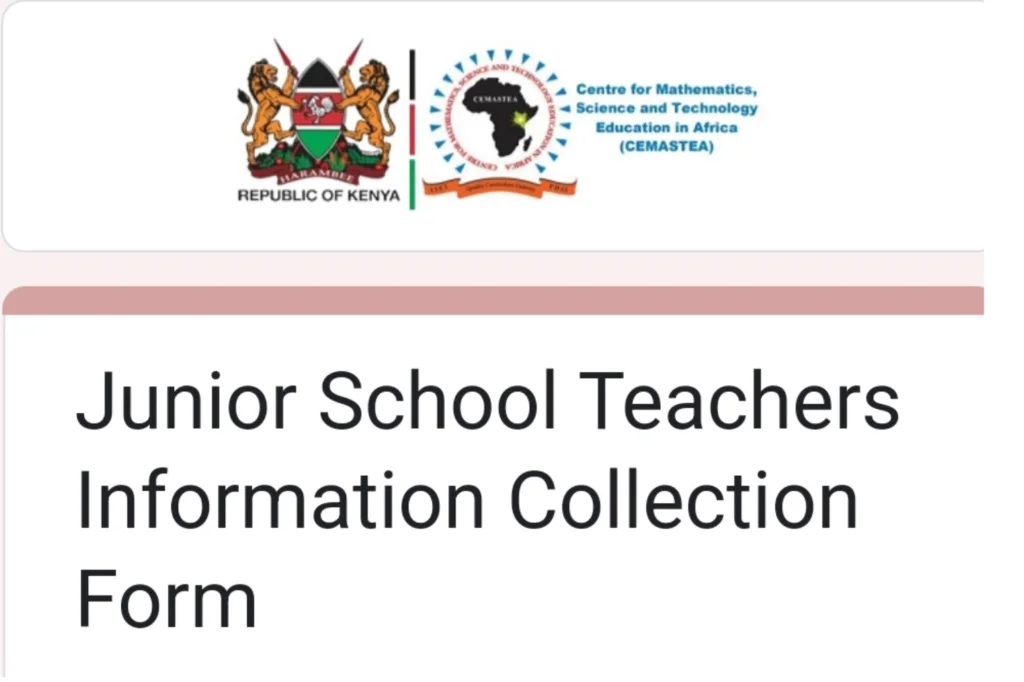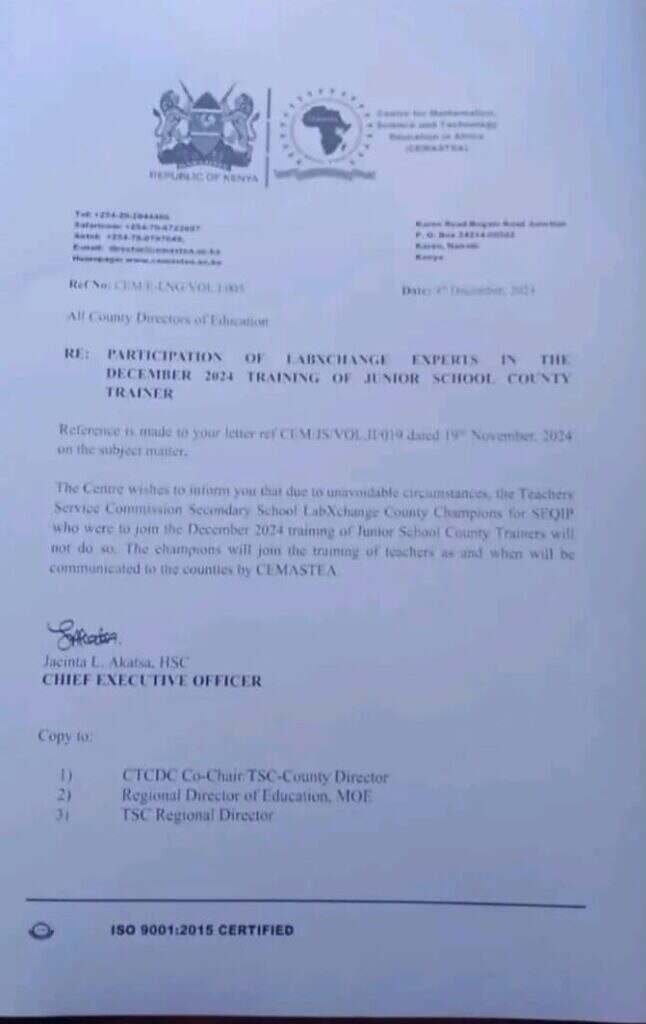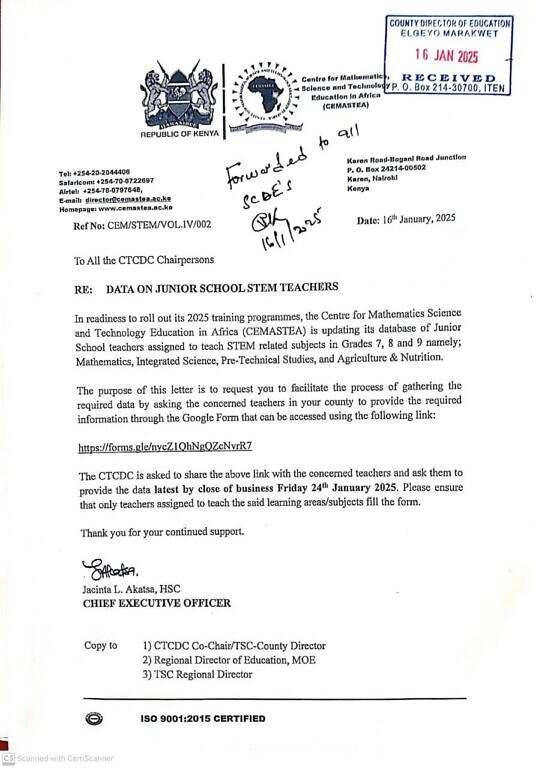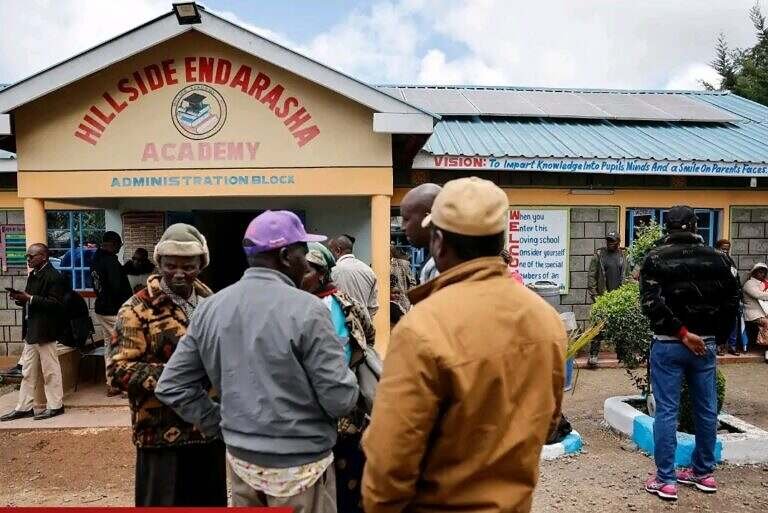
The Centre for Mathematics, Science and Technology Education in Africa (CEMASTEA) plays a pivotal role in enhancing STEM education across Kenya. Established to strengthen the teaching of mathematics and science, CEMASTEA is aligned with the broader educational goals set by the Ministry of Education Kenya. Its initiatives amplify the capacity-building efforts for teachers, particularly those involved in the implementation of the competency-based curriculum (CBC). In recent times, CEMASTEA has focused on providing robust support to teachers engaged in junior secondary school (JSS) programs through targeted training and development workshops.
Read more about CEMASTEA here
However, recent developments reveal an unexpected turn of events—the postponement of the December training session, initially slated for JSS teachers. This session was intended to equip educators with essential skills and knowledge, crucial for the effective delivery of the CBC, which emphasizes learner-centered and practical approaches to education. The delay has raised concerns among educators and stakeholders, particularly regarding the impact on teacher readiness in the context of the ongoing changes in the Kenyan education landscape.
The CEMASTEA STEM workshops are particularly significant, as they are designed to enhance the pedagogical skills of educators, enabling them to adopt innovative teaching strategies aligned with the demands of the CBC. Additionally, such training is expected to involve updates from the Teachers Service Commission (TSC) regarding policies, ensuring that educators are well-informed and adequately prepared. The recent competency-based curriculum delay has underscored the need for timely and effective teacher training, in order to maintain the momentum of educational reforms in Kenya, ultimately benefitting learners and the broader educational community.
What is CEMASTEA and Why is it Important?
The Centre for Mathematics, Science and Technology Education in Africa (CEMASTEA) is a pivotal institution in Kenya, primarily tasked with enhancing the quality of education in mathematics, science, and technology. Its mandate encompasses the training and development of teachers, particularly in the context of the Competency-Based Curriculum (CBC) that was recently implemented by the Ministry of Education Kenya. CEMASTEA’s initiatives aim to foster innovative teaching practices and equip educators with modern methodologies that align with global educational standards.
One of the core objectives of CEMASTEA is to promote learner-centered pedagogies, which prioritize the needs and abilities of students, fostering an engaging and participatory learning environment. This approach is particularly crucial for junior secondary school (JSS) teachers who are transitioning from traditional teaching models to more interactive methods that enhance student understanding and retention. Through various workshops focused on STEM education training Kenya, CEMASTEA aims to build teacher capacity and significantly improve the pedagogical skills necessary for effective delivery of the CBC.
The importance of these trainings cannot be overstated. As the demand for skilled teachers in STEM subjects grows, CEMASTEA provides essential resources and support for educators participating in the TSC training updates. By focusing on the integration of STEM practices, CEMASTEA ensures that JSS teachers are not only knowledgeable in their subjects but are also capable of imparting a progressive curriculum that meets the evolving educational landscape. The postponement of the recent training session highlights the complexities of maintaining an effective teacher development agenda amidst ongoing adjustments to the CBC and competency-based curriculum delay, emphasizing the critical role CEMASTEA plays in shaping the future of education in Kenya.
The Postponement Announcement

In a recent communication from the Ministry of Education Kenya, it was announced that the CEMASTEA training postponement for junior secondary school (JSS) teachers, scheduled for December, would not take place as planned. This decision, which was revealed merely days before the intended commencement, has raised concerns among educators and stakeholders involved in the ongoing implementation of the competency-based curriculum (CBC). The postponed training was aimed at enhancing educators’ skills and understanding of CBC, a critical component in revolutionizing the Kenyan education system.
The December session was expected to draw participation from over 1,000 teachers from across the country. This included educators from various disciplines, particularly in STEM education, which has been recognized as a priority area for improvement within the educational framework. The intention behind these workshops was to bolster teacher capacity-building in Kenya, ensuring that educators were adequately equipped to deliver the CBC effectively. The training was to include hands-on activities, collaborative learning, and interactive discussions led by experienced facilitators, all integral to supporting the professional development of JSS teachers.
However, logistical challenges were cited as the primary reason for the postponement. The disruptions included unforeseen circumstances relating to resource allocation, the availability of training venues, and potential staffing shortages. Such setbacks can significantly hinder the overall implementation schedule of teacher development initiatives in the country. Additionally, the training session’s delay may affect upcoming TSC training updates and the preparedness of teachers, which is essential for the successful integration of the curriculum into classrooms across the nation.
The postponement has left many educators anxious as they await further communication on rescheduling. The urgent need for timely training and professional development remains critical in achieving the objectives of CBC and enhancing the quality of education in Kenya.
Impact on Teachers and Schools
The recent postponement of the CEMASTEA training for Junior Secondary School (JSS) teachers has significant implications for educators and the broader educational landscape in Kenya. Teachers had diligently prepared for the training, which was anticipated to enhance their competence in implementing the Competency-Based Curriculum (CBC). The delay disrupts their professional development path and raises concerns about the ongoing readiness of teachers to effectively deliver quality education.
This postponement also affects the overall execution of the CBC in schools. As teachers await rescheduled training sessions, the integration of critical elements such as STEM education, which is central to the modern curriculum, may face delays. In particular, the lack of timely upskilling through CEMASTEA’s STEM workshops could inhibit teachers’ ability to adequately guide students in these innovative fields. Consequently, students may not receive the necessary guidance and instruction that aligns with the contemporary demands of education.
Furthermore, the competency-based curriculum delay could lead to a cascading effect on student performance. The lack of trained teachers proficient in CBC methodologies could hinder students’ learning experiences, potentially leading to gaps in knowledge and skills that are integral to their academic development. Teachers serve as key facilitators in nurturing critical thinking and problem-solving abilities in students, particularly in STEM-related subjects. Without proper training, their capacity to deliver these skills effectively becomes compromised.
Overall, the ministry of education’s decision to postpone the CEMASTEA training underlines an urgent need for rescheduling and swift implementation of TSC training updates. Addressing this delay with a proactive approach will be crucial in order to equip junior secondary school teachers with the skills necessary to foster an enriching educational environment conducive to effective learning and skill development in students.
Government and Ministry of Education Response
The recent postponement of the CEMASTEA training session for Junior Secondary School (JSS) teachers has elicited concern among educators and stakeholders in the educational sector. In response, the Ministry of Education Kenya and the Teachers Service Commission (TSC) have acknowledged the disruptions caused by this decision and have taken proactive steps to mitigate any negative impact on the implementation of the competency-based curriculum (CBC) in schools. This is particularly significant considering the emphasis on STEM education training in Kenya as part of the broader educational reform.
The Ministry indicated that the delay in the CEMASTEA training postponement arose from unexpected logistical challenges which were being addressed promptly. In a statement, they assured teachers that the junior secondary school teachers would receive the necessary training to ensure they are adequately prepared for the demands of the CBC. The Ministry’s commitment to teacher capacity-building in Kenya is evident as they outlined plans to reschedule the workshops without compromising the quality of professional development provided.
Furthermore, the TSC reiterated their dedication to keeping educators informed through regular updates regarding training schedules. They emphasized the importance of these trainings not only for compliance with the CBC teacher development initiatives but also for enhancing the overall quality of education delivered. The TSC stressed that they are working closely with CEMASTEA to ensure that future workshops, including those focused on STEM education training, align seamlessly with ongoing educational reforms.
As the situation unfolds, educators can remain assured that the Ministry of Education Kenya and TSC are committed to prioritizing the professional needs of teachers and improving educational outcomes despite the recent delays in training sessions. This commitment lays a solid foundation for the future of teaching in Kenya, ensuring that teachers are equipped with the necessary tools to implement the CBC effectively.
The Way Forward for JSS Teachers
The postponement of the December CEMASTEA training session for junior secondary school (JSS) teachers has created a gap in the professional development that is critical in implementing the Competency-Based Curriculum (CBC) in Kenya. In light of this delay, it is imperative for JSS teachers to adopt proactive measures that will aid in their continuous professional growth and help to bridge this interim period until the rescheduling of their training.
One effective approach is for teachers to engage in peer learning initiatives. By forming study groups or collaborative teaching teams, JSS teachers can share insights, resources, and pedagogical strategies. This kind of cooperation can enhance their understanding of the competency-based curriculum while also fostering a supportive community that addresses common challenges faced in classroom settings. Furthermore, the Ministry of Education Kenya emphasizes the importance of teacher collaboration, making this an opportune time for instructors to lean on each other’s strengths and knowledge.
In addition to peer learning, JSS teachers should take advantage of the plethora of online resources available for professional development. Various platforms offer valuable educational materials, including webinars, online courses, and articles focused on STEM education training in Kenya. Engaging with these resources can help teachers stay current with evolving teaching methodologies while waiting for the next CEMASTEA stem workshops. It is beneficial to stay informed about TSC training updates and any new initiatives undertaken by the ministry to ensure that their practices reflect the latest educational standards.
This interim period can serve as a catalyst for personal growth and adaptation among JSS teachers. By engaging in peer collaboration and utilizing online resources, educators can enhance their capacity to deliver quality education in alignment with the CBC. The road forward requires commitment to ongoing professional development, ensuring that they are well-prepared for the complexities of teaching in the modern educational landscape.
Conclusion
The recent postponement of the CEMASTEA training for junior secondary school (JSS) teachers highlights the significant challenges faced in implementing the competency-based curriculum (CBC) in Kenya. As the Ministry of Education Kenya continues to spearhead these educational reforms, the importance of timely and effective training for teachers cannot be overstated. The disruption associated with the cemastea training postponement has raised concerns about the readiness of teachers to execute the CBC effectively, which is designed to foster critical thinking and innovation among students.
Furthermore, the delays in the JSS teacher training signify a broader issue regarding logistical planning and communication from the education authorities to the stakeholders involved, including teachers and educational institutions. Enhanced communication strategies and robust logistical support are essential to ensure educators are furnished with the necessary skills and knowledge to thrive in classrooms. This is particularly important as the inclusion of STEM education training with a focus on teacher capacity-building Kenya is vital to cultivate a generation that can thrive in technology-driven environments.
While the recent developments may cause concern among educators and policymakers alike, they also present an opportunity for reflection and growth within the framework of CBC teacher development. The commitment to providing comprehensive STEM education through CEMASTEA stem workshops is commendable, and ensuring that teacher training aligns with these goals is crucial for future success. By learning from these challenges and reinforcing support systems within the Ministry of Education Kenya, the country can work towards a more resilient teaching workforce, ultimately fostering an educational environment where every student can excel under the CBC mandate.
Call to Action
The recent postponement of the CEMASTEA training sessions for junior secondary school teachers has elicited various responses from the education community. As educators, we recognize the importance of continuing professional development, particularly within the framework of the competency-based curriculum (CBC) that the Ministry of Education Kenya advocates. Therefore, it is essential for teachers to share their experiences, concerns, and suggestions regarding the impacts of this training delay. Your voices can help shape future training programs, ensuring they meet the needs of all educators engaged in the transformative journey of implementing the CBC.
We invite all educators to participate actively in discussions surrounding the postponement of the December training session. Have you encountered any challenges that could be alleviated by enhanced training, such as in STEM education training in Kenya? Are there specific areas within the CBC teacher development framework that require immediate attention? Sharing your insights can contribute to a collective effort to enhance teacher capacity-building in Kenya. It is critical to create a forum where such conversations can thrive, ensuring that the concerns of junior secondary school teachers are heard and addressed.
To stay informed about updates related to the new schedule of the CEMASTEA training sessions, we encourage you to follow official communications and TSC training updates. Keeping abreast of these developments ensures that educators remain prepared and equipped to adapt to the evolving educational landscape in Kenya. Furthermore, we can facilitate ongoing dialogue about the effects of the competency-based curriculum delay on our classrooms and explore potential strategies for immediate and long-term improvement.
Ultimately, your engagement is crucial in forging a path forward. Together, we can strengthen our collective response to the challenges at hand and ensure that every educator is empowered to deliver quality education within the context of the CBC.






